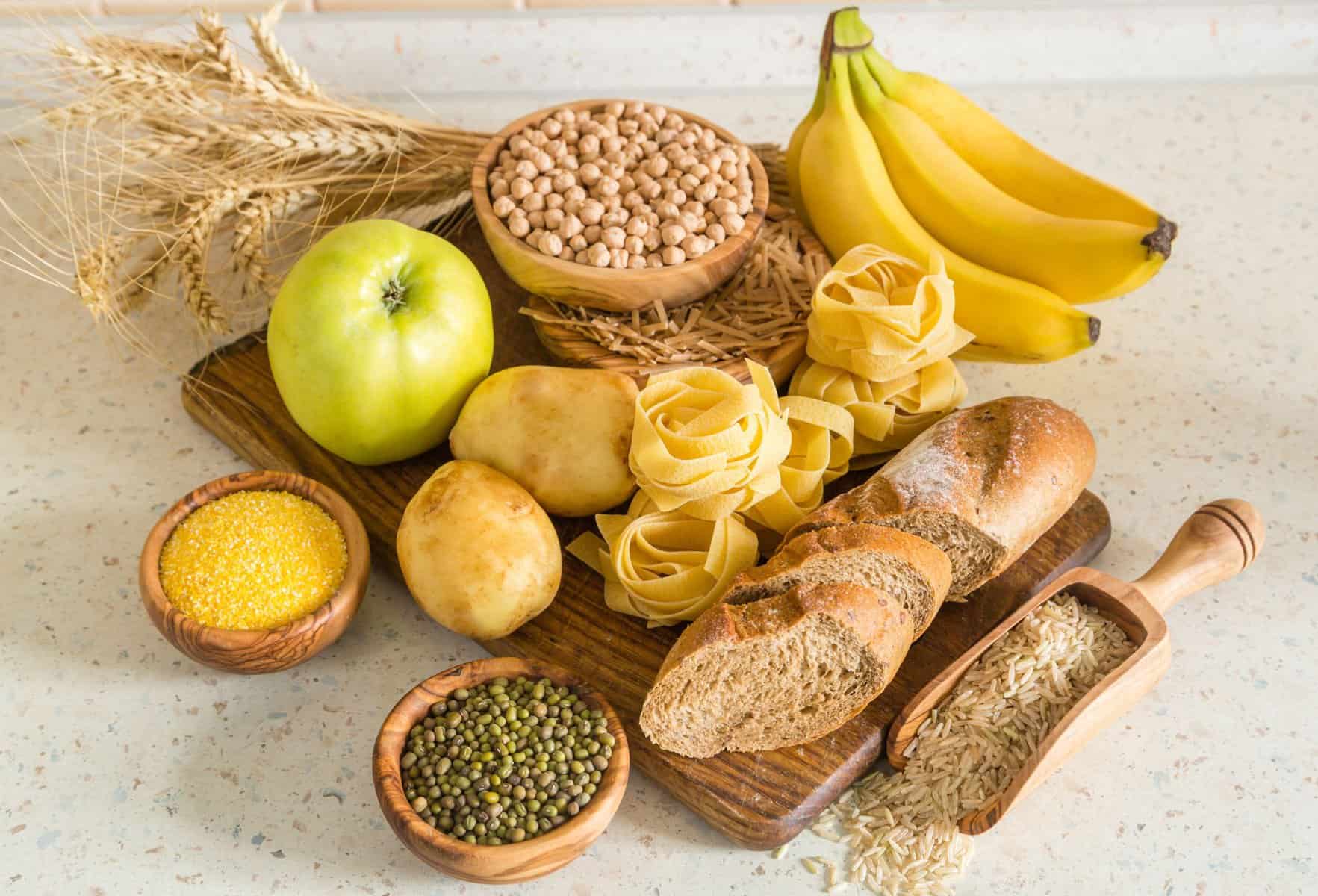
Resistant starch has recently gained popularity in the health world. Read on to find out why this type of starch is called ‘resistant’, how it could benefit your health and practical ways to get more resistant starch in your diet!
What is Resistant Starch?
During digestion, most of the carbohydrate that is eaten is broken down in the small intestine.
However, resistant starch is a type of carbohydrate that ‘resists’ digestion in the small intestine.
It passes through to the large intestine, where it is fermented by the gut bacteria to produce short chain fatty acids (SCFA). SCFA are a major fuel source for the cells of the large intestine, and they promote immune function and maintain the lining of the intestine.
Potential Benefits of Resistant Starch
While the early research on the potential benefits of resistant starch is certainly exciting, it’s important to look at high quality research (such as systematic reviews, which methodically evaluate and synthesise the relevant literature to answer a specific question, as opposed to simply reading individual studies). An outline of levels of evidence can be found here.
At this stage, there are few systematic reviews on the effects of resistant starch in humans, and the population sizes of the studies are generally small. Below is a summary of potential health benefits of resistant starch based on the best quality evidence available – there are some promising results and it will be exciting to see where this research goes in the future!
Gut health
Resistant starch may improve gut health through prebiotic activity. Some types of resistant starch may be prebiotics, meaning they ‘provide health benefits by specifically altering either the composition or function of the gut microbiota.’ (1).
Prebiotics act as food for the beneficial bacteria of the gut, stimulating their growth and activity, and increasing their diversity and density.
It has been hypothesised that a lack of gut bacteria diversity in Western populations has contributed to an increased prevalence of chronic disease, allergies and autoimmune conditions. Thus, it has been proposed that an increased intake of resistant starch may be beneficial for health due to its potential to improve gut microbiome diversity.
Anti-inflammatory & antioxidant markers
A recent systematic review and meta-analysis found that supplementation of resistant starch may be effective in reducing specific oxidative stress and inflammation biomarkers, such as malondialdehyde (MDA) and C-reactive protein (CRP) in T2DM patients, and tumour necrosis factor-α (TNF-α) and interleukin-6 (IL-6) in non-T2DM patients (2). A proposed reason for these improvements is the promotion of growth of Bifidobacteria by resistant starch, which possesses antioxidant properties.
Diabetes
A systematic review found that resistant starch supplementation was associated with a significant reduction in fasting insulin, fasting blood sugar levels and HbA1c (a long-term measure of blood sugar levels), with a significant increase in a measure of insulin sensitivity (HOMA-S) (3). These results suggest that resistant starch may help with blood glucose level management in diabetes.
Cholesterol
Resistant starch supplementation may contribute to reduced cholesterol levels, specifically total cholesterol and LDL cholesterol, particularly with supplementation periods longer than 4 weeks and doses above 20g per day (4).
Read here for more information on types of cholesterol.
Appetite
The consumption of resistant starch appears to reduce post-meal appetite.
A systematic review found that supplementation with resistant starch, especially with doses above 25g, significantly reduced appetite scores (5).
The findings of this review are limited by the number of studies and the low number of participants.
Although it is unclear how resistant starch reduces appetite, a proposed mechanism is that resistant starch may delay gastric emptying (the time taken for food to be emptied from the stomach), thereby increasing satiety and decreasing appetite.
How to Improve Resistant Starch Intake
Unlike other types of fibre, with resistant starch it may take some time before you see the potential effects, for example on your digestion and bowel output. When fibre intake is increased, its effects on digestion and bowel output can be observed shortly after. With resistant starch, it may take some time before the potential benefits are seen; in the meantime, remember that a lot is happening behind the scenes in improving gut microbiota diversity, which will eventually have a beneficial effect on health.
Try these options to increase your intake of resistant starch, as part of a healthy eating pattern!
1. Foods naturally containing resistant starch
These foods can be incorporated into a healthy diet to increase intake of resistant starch (6):
- Legumes (e.g., butter beans, kidney beans, black beans, lentils, chickpeas)
- Bananas, plantains
- Grain products (e.g., breads, pasta, noodles, rice, cereals)
- White potato
- Green banana powder – this can be used as a partial replacement for flour in baking or raw baking, or as a thickener.
2. Leftovers
Who knew you could get more resistant starch through simply having leftovers?
But not just any leftovers – you can increase your resistant starch intake through cooking and then cooling starch-containing foods such as potato, rice and pasta.
While these foods cool after being cooked, the structure of the starch changes and becomes more tightly packed. The starch is then more resistant to being broken down during digestion, thereby increasing the amount of resistant starch. Yay for leftovers!
3. Products containing Barleymax
Barleymax is a wholegrain developed by CSIRO which is high in resistant starch and fibre. Making swaps from products you might normally eat to those that contain Barleymax is a simple way to increase resistant starch.
At the time of writing, the following products contain Barleymax:
- Coles Happy Gut bread range
- Bakers Delight Prebiotic Cape Seed loaf
- Coles Wellness Road toasted muesli products
Conclusion
Resistant starch has promising health benefits, and is likely to possess far more than we know at this stage! Although it is unlikely to be the single dietary factor that prevents chronic health conditions or gut issues, it is worth including resistant starch in your eating pattern regularly.
It’s best to view resistant starch as one part of a balanced, wholefoods-based eating pattern that may contribute to overall health.
Do you want further support managing your gut health or a chronic health condition? We are here to help!
References
- ISAPP; USA: International Scientific Association for Probiotics and Prebiotics. Prebiotics. 2019 [cited 2023 Apr 20]. Available from https://isappscience.org/wp-content/uploads/2019/04/Prebiotics_Infographic_rev1029.pdf
- Lu, J. et al. (2021). Effects of resistant starch supplementation on oxidative stress and inflammation biomarkers: A systematic review and meta-analysis of randomized controlled trials. Asia Pacific journal of clinical nutrition, 30(4), 614–623. https://doi.org/10.6133/apjcn.202112_30(4).0008
- Wang, Y. et al. (2019). Effects of the resistant starch on glucose, insulin, insulin resistance, and lipid parameters in overweight or obese adults: a systematic review and meta-analysis. Nutr. Diabetes 9, 19. https://doi.org/10.1038/s41387-019-0086-9
- C. Yuan et al. (2018). Meta-analysis indicates that resistant starch lowers serum total cholesterol and low-density cholesterol. Nutrition Research, 54, 1-11, ISSN 0271-5317, https://doi.org/10.1016/j.nutres.2018.02.008.
- Amini, S. et al. (2021). The effect of acute consumption of resistant starch on appetite in healthy adults; a systematic review and meta-analysis of the controlled clinical trials. Clinical Nutrition ESPEN. 41. 10.1016/j.clnesp.2020.12.006.
- Patterson, M. A. et al. (2020). Resistant Starch Content in Foods Commonly Consumed in the United States: A Narrative Review. Journal of the Academy of Nutrition and Dietetics, 120(2), 230–244. https://doi.org/10.1016/j.jand.2019.10.019



